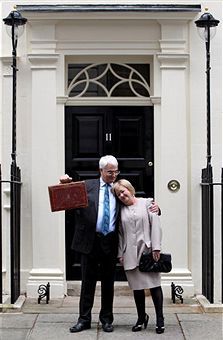 Alistair Darling was terribly proud of the Government’s record in his Budget speech today. But he again dodged the question of how he’ll get the deficit under control. Ruth Lea has called this his “do little” Budget. With the country still facing hundreds of billions in borrowing, the few billion being saved are virtually neglible. There are huge downside risks for those borrowing forecasts as we get onto the more contentious growth projections from 2011-12 onwards, which are way above City expectations. And everything will get much worse if borrowing costs rise – Mike Denham has explored the frightening possibilities in a blog for the TPA.
Alistair Darling was terribly proud of the Government’s record in his Budget speech today. But he again dodged the question of how he’ll get the deficit under control. Ruth Lea has called this his “do little” Budget. With the country still facing hundreds of billions in borrowing, the few billion being saved are virtually neglible. There are huge downside risks for those borrowing forecasts as we get onto the more contentious growth projections from 2011-12 onwards, which are way above City expectations. And everything will get much worse if borrowing costs rise – Mike Denham has explored the frightening possibilities in a blog for the TPA.
We had a proud boast that Britain has “the fastest deficit reduction plan of any G7 country”, a massive Brownie. That might have something to do with having the biggest deficit in the G7. Even leaving that aside, to call the Government’s hopeful aspirations, now farcically enshrined in law, a “deficit reduction plan” is a bit ridiculous. The need to produce concrete policies that will actually bring down deficits has been left for the in-tray of whoever is Chancellor after the election. The best we got at this Budget in terms of spending cuts was a proposal to reform Housing Benefit, which might save £50 million “in steady state” (as opposed to this year).
Of course, people don’t expect much from a Budget being held so soon before the election. It is incredible to have the biggest government financial statement of the year playing almost no part in the serious fiscal debate though. No one should be distracted by the fiddles, mostly attempts to use fiscal policy for economic micromanagement. The key question before the Budget was, how are politicians going to cut public spending? The question is still, how are politicians going to cut public spending?
That is the question we’re addressing in the new TPA book How to Cut Public Spending (and Still Win an Election).
Matthew Sinclair is research director of the Taxpayers’ Alliance






Comments